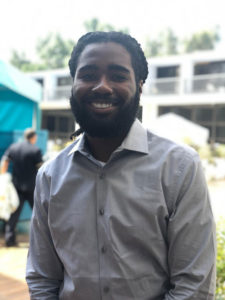#NNPA BlackPress
New Orleans Residents Respond to the Spread of the Coronavirus
NEW ORLEANS DATA NEWS WEEKLY — “We just finished Mardi Gras season with hundreds of thousands of people visiting our city. I pray that no one has brought the virus here,” said Tyler Townsend, a senior biology major at Xavier University of Louisiana, who is a native of Los Angeles, Calif. “It’s like we were an open target for the coronavirus,” Townsend said, given the city’s many festivals and events that attract tourists from all over the world. “I am ready for the coronavirus, but it is no secret that I am still nervous about it as well,” he added.
 By Jordan Deloch, Data News Weekly Contributor
By Jordan Deloch, Data News Weekly Contributor
Over the span of January to March, in response to the worldwide spread of coronavirus (COVID-19), U.S. citizens say they are now increasing their awareness about the virus and finding ways to prevent its spreading. World health officials place the total number of infected persons at over 100,000 people with over 3,802 deaths. In the United States, the Centers for Disease Control and Prevention has reported around 400 cases in 33 states, with 21 deaths. The states with the most cases reported are Washington State, New York, and California. As of the first week of March, no known cases have been reported in Louisiana, however, in neighboring Texas, there have been eight reported cases of positive testing.
“The coronavirus is honestly scary. There is no telling how and when the virus can be spread to our city,” said Christina Williams, an Uptown, New Orleans resident and youth mentor. “Nor is there a way to know what has caused this virus,” Williams said, adding that: “The fact that this virus could come, and people not know about it is nerve-wrecking.”
 Workers in the city said that many workplaces have restricted travel for employees, and schools have sent notifications to parents of the possible threat that the virus poses, and to encourage enhanced hygiene.
Workers in the city said that many workplaces have restricted travel for employees, and schools have sent notifications to parents of the possible threat that the virus poses, and to encourage enhanced hygiene.
“We just finished Mardi Gras season with hundreds of thousands of people visiting our city. I pray that no one has brought the virus here,” said Tyler Townsend, a senior biology major at Xavier University of Louisiana, who is a native of Los Angeles, Calif. “It’s like we were an open target for the coronavirus,” Townsend said, given the city’s many festivals and events that attract tourists from all over the world. “I am ready for the coronavirus, but it is no secret that I am still nervous about it as well,” he added.
The increase in concern about the spread of the virus to each state has led to a shortage of face masks, hand sanitizers and household cleaning products at major retail outlets in the city, residents noted.
“The coronavirus is real and spreading, but I don’t really know what more there is for me to do except playing my part by washing my hands and being mindful of my daily activity in terms of hygiene,” said Shania Campbell, a Dillard University student. “People are afraid of this virus, but in reality, there are so many other dangers at hand. Everything needs awareness, not just this,” Campbell said.
While some residents said they are taking new precautions, others said they are used to preparedness and disruptions to the routine that come with other hazards the city faces each year.
 “Being the normally hygienically aware individual that I always am, any other efforts are speculative at best,” said Percy Marchand, a Mid-City resident and business owner. “Also, I am stocked up on goods just in case, but again, living in New Orleans, we are always stocked up and prepared for a disaster,” Marchand said.
“Being the normally hygienically aware individual that I always am, any other efforts are speculative at best,” said Percy Marchand, a Mid-City resident and business owner. “Also, I am stocked up on goods just in case, but again, living in New Orleans, we are always stocked up and prepared for a disaster,” Marchand said.
Residents said they felt some attention has been taken away from yearly viruses such as the flu, which is the more prominent virus of the two. For Louisiana, while there have not been any reported cases of the coronavirus, the virus is still being spread in the midst of influenza season, which runs from October to April. Last year, state officials reported that there were 14,000 hospitalizations and around 1,400 deaths from the flu.
“Honestly, I’m not really worried about the virus. To me, it’s just another running case of something to be worried about,” said Ernest Lumpkins, an Uptown New Orleans resident. “Every year, it’s something different. Before it was the Swine Flu (H1N1), now it’s this. This doesn’t bother me at all,” Lumpkins added.
Still residents said they will continue to take steps to protect themselves and their families.
“All measures of safety are appreciated. This is a serious time and nothing to play with,” said Marianne Alexis, a New Orleans East resident. “You can never be too safe. I take precautions every day by washing my hands and being aware of my surroundings,” Alexis added.
This article originally appeared in New Orleans Data News Weekly.
#NNPA BlackPress
Remembering George Floyd
#NNPA BlackPress
OP-ED: Oregon Bill Threatens the Future of Black Owned Newspapers and Community Journalism
BLACKPRESSUSA NEWSWIRE — Nearly half of Oregon’s media outlets are now owned by national conglomerates with no lasting investment in local communities. According to an OPB analysis, Oregon has lost more than 90 news jobs (and counting) in the past five years. These were reporters, editors and photographers covering school boards, investigating corruption and telling community stories, until their jobs were cut by out-of-state corporations.

By Dr. Benjamin F. Chavis, Jr.
President and CEO, National Newspaper Publishers Association
For decades, The Skanner newspaper in Portland, the Portland Observer, and the Portland Medium have served Portland, Oregon’s Black community and others with a vital purpose: to inform, uplift and empower. But legislation now moving through the Oregon Legislature threatens these community news institutions—and others like them.
As President and CEO of the National Newspaper Publishers Association (NNPA), which represents more than 255 Black-owned media outlets across the United States—including historic publications like The Skanner, Portland Observer, and the Portland Medium—l believe that some Oregon lawmakers would do more harm than good for local journalism and community-owned publications they are hoping to protect.
Oregon Senate Bill 686 would require large digital platforms such as Google and Meta to pay for linking to news content. The goal is to bring desperately needed support to local newsrooms. However, the approach, while well-intentioned, puts smaller, community-based publications at a future severe financial risk.
We need to ask – will these payments paid by tech companies benefit the journalists and outlets that need them most? Nearly half of Oregon’s media outlets are now owned by national conglomerates with no lasting investment in local communities. According to an OPB analysis, Oregon has lost more than 90 news jobs (and counting) in the past five years. These were reporters, editors, and photographers covering school boards, investigating corruption, and telling community stories, until their jobs were cut by out-of-state corporations.
Legislation that sends money to these national conglomerate owners—without the right safeguards to protect independent and community-based outlets—rewards the forces that caused this inequitable crisis in the first place. A just and inclusive policy must guarantee that support flows to the front lines of local journalism and not to the boardrooms of large national media corporations.
The Black Press exists to fill in the gaps left by larger newsrooms. Our reporters are trusted messengers. Our outlets serve as forums for civic engagement, accountability and cultural pride. We also increasingly rely on our digital platforms to reach our audiences, especially younger generations—where they are.
We are fervently asking Oregon lawmakers to take a step back and engage in meaningful dialogue with those most affected: community publishers, small and independent outlets and the readers we serve. The Skanner, The Portland Observer, and The Portland Medium do not have national corporate parents or large investors. And they, like many smaller, community-trusted outlets, rely on traffic from search engines and social media to boost advertising revenue, drive subscriptions, and raise awareness.
Let’s work together to build a better future for Black-owned newspapers and community journalism that is fair, local,l and representative of all Oregonians.
Dr. Benjamin F. Chavis Jr., President & CEO, National Newspaper Publishers Association
#NNPA BlackPress
Hate and Chaos Rise in Trump’s America
BLACKPRESSUSA NEWSWIRE — Tactics ranged from local policy manipulation to threats of violence. The SPLC documented bomb threats at 60 polling places in Georgia, traced to Russian email domains.

By Stacy M. Brown
Black Press USA Senior National Correspondent
The Southern Poverty Law Center has identified 1,371 hate and antigovernment extremist groups operating across the United States in 2024. In its latest Year in Hate & Extremism report, the SPLC reveals how these groups are embedding themselves in politics and policymaking while targeting marginalized communities through intimidation, disinformation, and violence. “Extremists at all levels of government are using cruelty, chaos, and constant attacks on communities and our democracy to make us feel powerless,” said SPLC President Margaret Huang. The report outlines how hard-right groups aggressively targeted diversity, equity, and inclusion (DEI) initiatives throughout 2024. Figures on the far right falsely framed DEI as a threat to white Americans, with some branding it a form of “white genocide.” After the collapse of Baltimore’s Francis Scott Key Bridge, a former Utah legislator blamed the incident on DEI, posting “DEI = DIE.”
Tactics ranged from local policy manipulation to threats of violence. The SPLC documented bomb threats at 60 polling places in Georgia, traced to Russian email domains. Similar threats hit Jewish institutions and Planet Fitness locations after far-right social media accounts attacked them for trans-inclusive policies. Telegram, which SPLC describes as a hub for hate groups, helped extremists cross-recruit between neo-Nazi, QAnon, and white nationalist spaces. The platform’s lax moderation allowed groups like the Terrorgram Collective—designated terrorists by the U.S. State Department—to thrive. Militia movements were also reorganized, with 50 groups documented in 2024. Many, calling themselves “minutemen,” trained in paramilitary tactics while lobbying local governments for official recognition. These groups shared personnel and ideology with white nationalist organizations.
The manosphere continued to radicalize boys and young men. The Fresh & Fit podcast, now listed as a hate group, promoted misogyny while mocking and attacking Black women. Manosphere influencers used social media algorithms to drive youth toward male-supremacy content. Turning Point USA played a key role in pushing white nationalist rhetoric into mainstream politics. Its leader Charlie Kirk claimed native-born Americans are being replaced by immigrants, while the group advised on Project 2025 and organized Trump campaign events. “We know that these groups build their power by threatening violence, capturing political parties and government, and infesting the mainstream discourse with conspiracy theories,” said Rachel Carroll Rivas, interim director of the SPLC’s Intelligence Project. “By exposing the players, tactics, and code words of the hard right, we hope to dismantle their mythology and inspire people to fight back.”
Click here for the full report or visit http://www.splcenter.org/resources/guides/year-hate-extremism-2024.
-

 Activism4 weeks ago
Activism4 weeks agoAI Is Reshaping Black Healthcare: Promise, Peril, and the Push for Improved Results in California
-

 Activism4 weeks ago
Activism4 weeks agoBarbara Lee Accepts Victory With “Responsibility, Humility and Love”
-

 Activism4 weeks ago
Activism4 weeks agoESSAY: Technology and Medicine, a Primary Care Point of View
-

 Activism4 weeks ago
Activism4 weeks agoFaces Around the Bay: Author Karen Lewis Took the ‘Detour to Straight Street’
-

 Arts and Culture4 weeks ago
Arts and Culture4 weeks agoBOOK REVIEW: Love, Rita: An American Story of Sisterhood, Joy, Loss, and Legacy
-

 Activism4 weeks ago
Activism4 weeks agoNewsom Fights Back as AmeriCorps Shutdown Threatens Vital Services in Black Communities
-

 #NNPA BlackPress4 weeks ago
#NNPA BlackPress4 weeks agoThe RESISTANCE – FREEDOM NOW
-

 Activism4 weeks ago
Activism4 weeks agoTeachers’ Union Thanks Supt. Johnson-Trammell for Service to Schools and Community














































